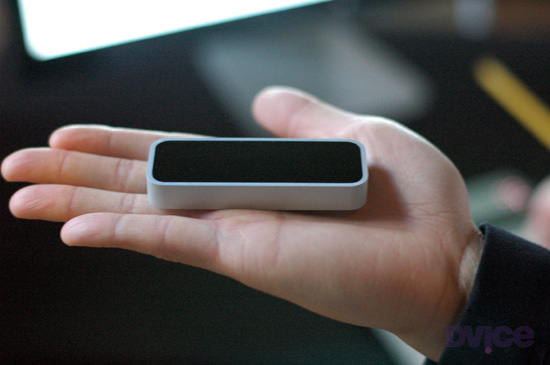Another Leap Towards True VR
It’s small, and according to its makers, it could be even smaller, and yet, it’s probably going to be one of the biggest “disruptive technologies†for the computer this year. It’s called the “Leapâ€, and it will change nearly everything about how you interact with your computer.
In a 2010 article for H+ I talked about the prototype for the Kinect, and how it was a step towards “Good Enough VRâ€. Then, I showed ways the Kinect has been used in a variety of fields. Despite this, the Kinect hasn’t really become an “every day†computer interface because it’s not terribly precise; it isn’t easy to connect to a computer instead of your Xbox, and has thus been relegated to the realm of “super geeks†for anything outside of the rather limited “intended use†for the average person.
Why? Think about it for a second. Think about why you don’t currently have a touchscreen computer monitor. As nice as touch screen is on your smart phone or tablet is, don’t you hate wiping off all those fingerprints? As wonderful as the intuitive “multitouch†interface is, aren’t those screens just way too expensive to make in sizes closer to what your monitor likely is? Oh, and isn’t there that concern that the “Rare Earths†needed to make them are limited, and mainly supplied by China?
Now, think about the fact that the Leap will enable any computer to act as if it had a touchscreen.
Without, you know, actually needing a touchscreen.
Then think about it a little more. At millimeter accuracy, it can not only read your fingertips, but tell if you are using a pen. So not only can it be used like a touchscreen; it can also be used like a digitizing table. It could track your fingers on a table top to allow you to type without a keyboard, or move your cursor without a mouse. Unlike the makers of Leap, I won’t say it will eliminate these devices, but I will point out that you could cut the cords off of both of them and still retain all the functionality. And you wouldn’t even need to keep batteries in your wireless versions.
In other words, it will turn them into props. Don’t actually have a mouse? Pick up anything mouse sized and it becomes one. Want a “real gun†for your first person shooter? Pick up a Nerf gun and bang, you suddenly don’t need an expensive “Virtual gun†like those for the Move or Wii. Need to draw in an art program? Why bother buying an expensive Wacom tablet when a twig will serve just as well. I’m sure that they will try like hell to maintain a market share, but let’s face it, the days of Logitech, Wacom, and any other “computer interface device†manufacturers are numbered.
But that’s nowhere near the end of the uses that the Leap will enable — because the secret to the Leap is not the hardware. That little device is actually made from really cheap components. The real disruptive tech is the algorithms that power that hardware, because it can be incorporated into smaller devices, as well as use different kinds of sensors — and as we develop new sensors, it will enable us to use them as well. All of this means that the “touchscreen†industry just received it’s death notice as well. Give it a year, and we will likely see “touchscreen†devices that are cheaper, tougher, and don’t require us to actually touch the screen.
And beyond that, since the Leap “maps†space in a “field,†instead of a two dimensional plane like the Kinect, it will enable the first stages of the “self aware world†I’ve described in a previous Acceler8or piece as being a necessary part of omnipresent VR. Imagine walking into your Walmart and using any of those “advertisement screens†to pull up a help screen that can tell you where the item you are looking for is. Imagine a store window display that you can use through the glass.
And that just barely begins to “touch†on the myriad uses for the Leap. So yeah, have fun thinking about how you could use one, because even if you don’t buy one the day it hits the shelves, you won’t be able to avoid one for long. And in a few years, you will probably wonder how we ever survived without it.

